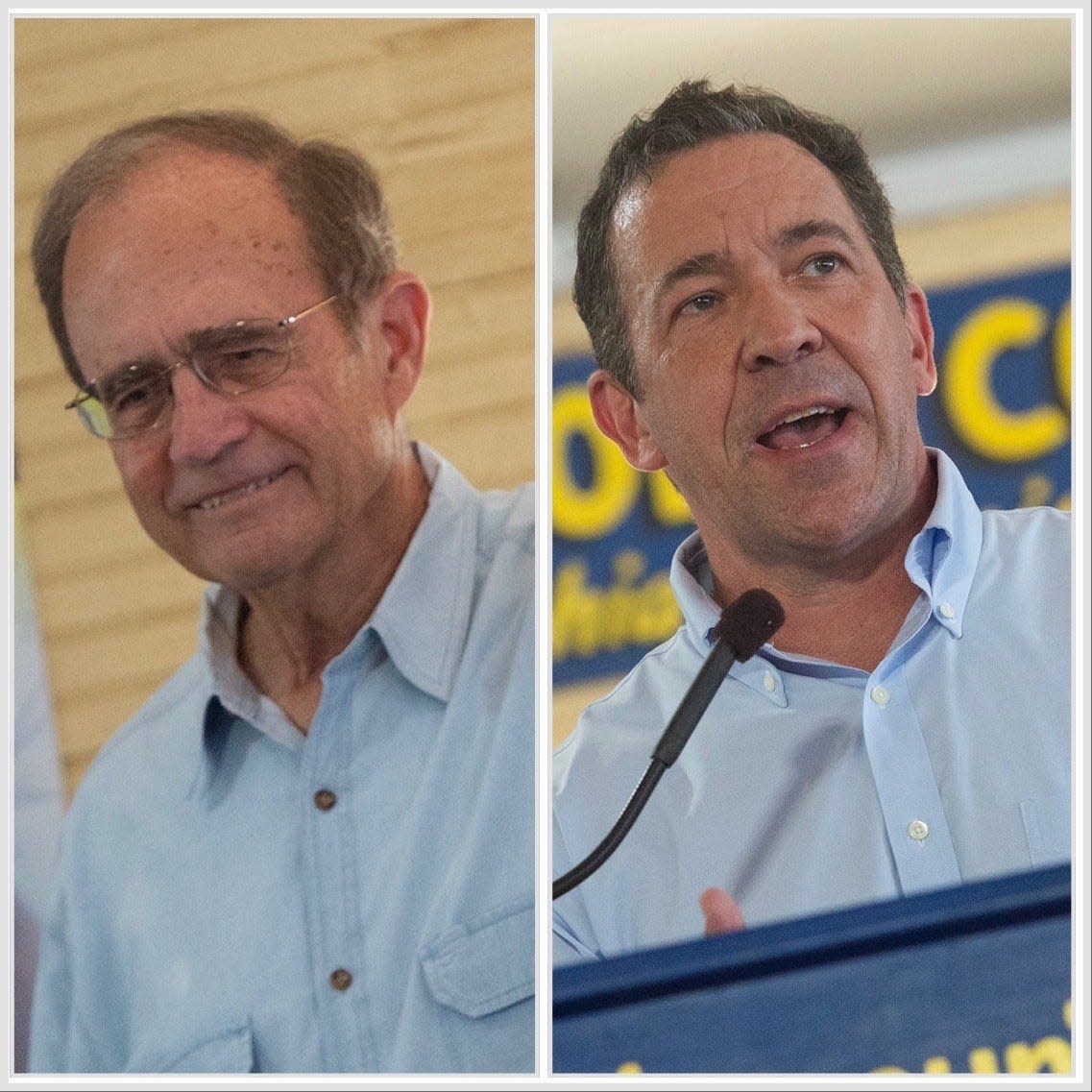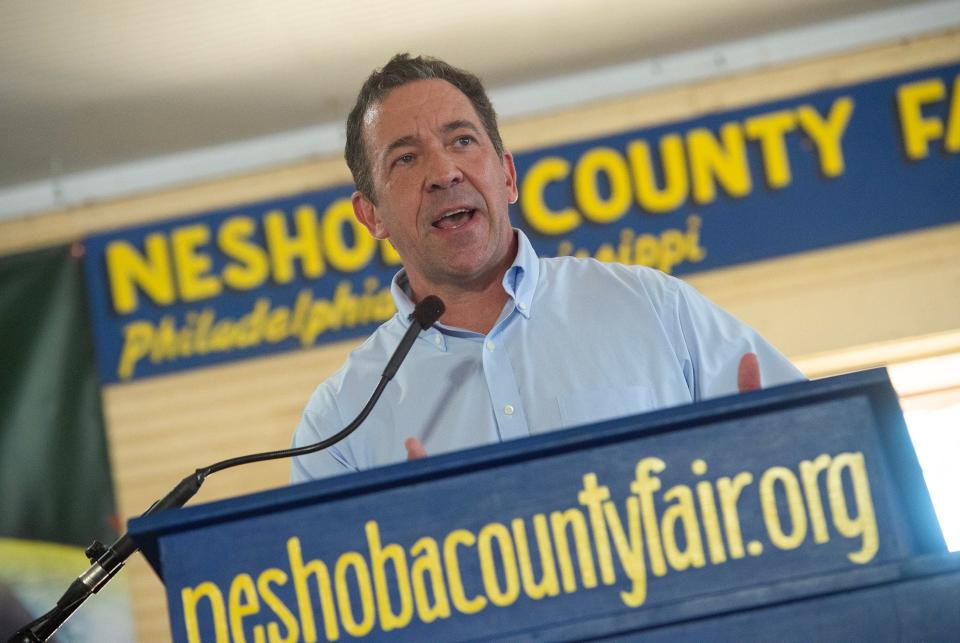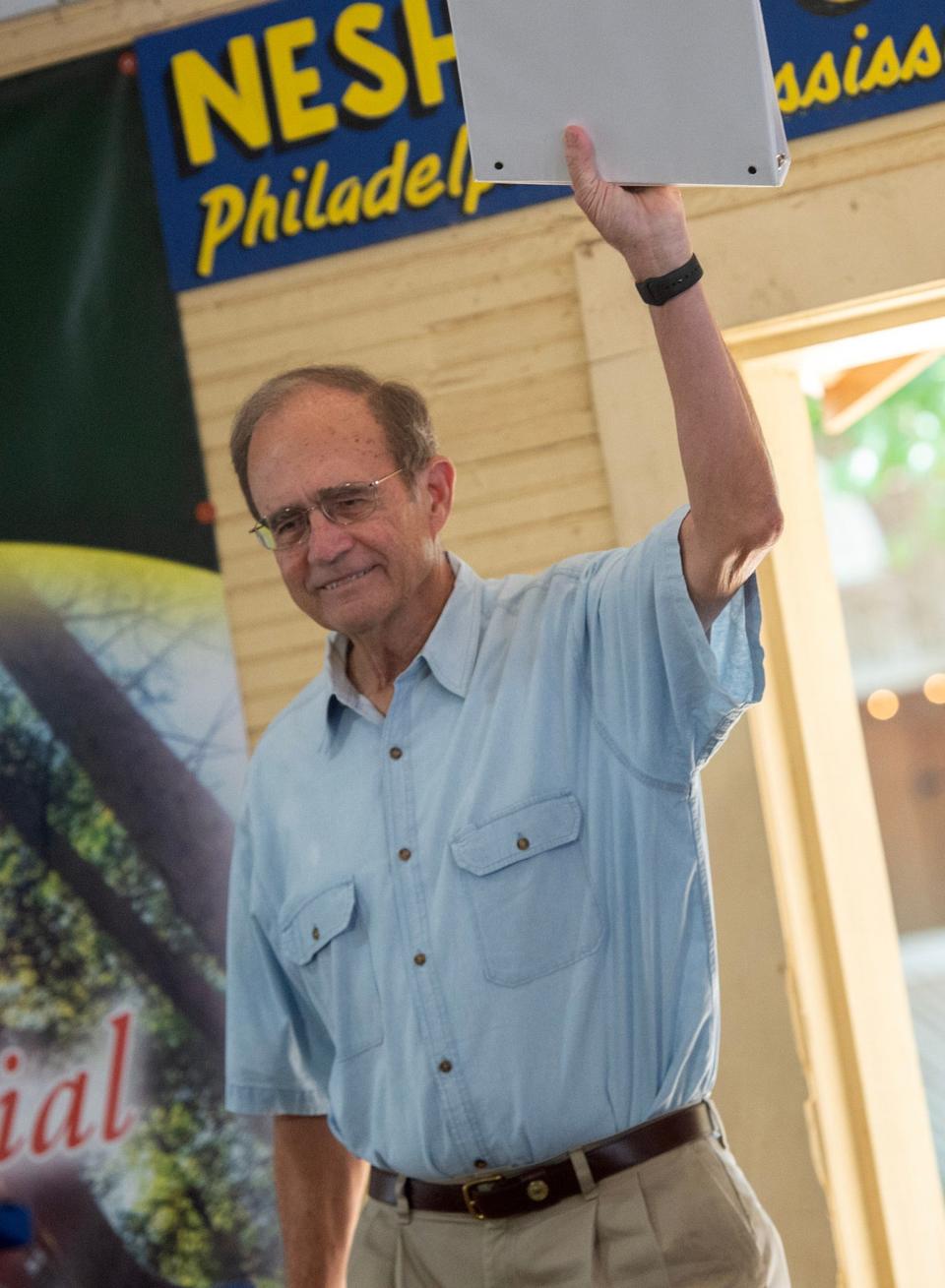Compare Delbert Hosemann, Chris McDaniel on issues like abortion, taxes, ballot initiative

- Oops!Something went wrong.Please try again later.
- Oops!Something went wrong.Please try again later.
With less than two weeks until Mississippi voters go to the polls to vote in primaries for this year's statewide elections, one of the most hotly contested races continues to be the Republican primary for lieutenant governor.
State Sen. Chris McDaniel is for the third time in his political career attempting to run to the right of a Republican incumbent. After running against sitting Republican U.S. Senators in 2014 and 2018, McDaniel is this time challenging incumbent Lt. Gov. Delbert Hosemann, a lifelong Republican, who McDaniel says is secretly "Delbert the Democrat."
The two men, though members of the same party, are very different in political style, record and background. While Hosemann launched his first statewide campaign with ads poking fun at his own name, McDaniel's U.S. Senate runs were far more ruthless. In 2014, just as he has in this year's race, McDaniel repeatedly said he respected U.S. Sen. Thad Cochran, while also launching attack ads labeling the longtime Republican as not conservative enough and a member of an out-of-touch political class.

In this race, Hosemann has largely pushed back against those kinds of claims, pointing to his record on running the state like a business, and also to endorsements from powerful national conservative groups like Right to Life and the political action committee for the National Rifle Association.
While the two men have their clear differences, talking points in the race have largely come down to a question of conservative bona fides, leaving voters to wonder just how far apart they really are on policy.
Here's where each candidate stands on some of the biggest issues:

Abortion
In recent days and weeks, the race has taken a sharp turn toward abortion.
McDaniel has resurfaced decades old accusations that Hosemann was once "vice president of an abortion clinic."
Hosemann is Catholic and a University of Notre Dame graduate who has been repeatedly endorsed by Mississippi Right to Life over the past 25 years and is endorsed by the national arm of the group in the race against McDaniel. The lieutenant governor has said he provided legal services to a women's health clinic in the 1970s and early '80s, before it ever began providing abortions. Hosemann has further said he was mistakenly included on some of the clinic's paperwork years after he left, a claim backed up by a 1998 memo written by the clinic's president and later obtained by the Associated Press.
"In 1981 I quit representing them," Hosemann said at the Neshoba County Fair. "The guy ran the clinic said I didn't have anything to do with them after 1981 ... So, it's just false. It's just totally false."
Yet, even after the 1998 memo was reported, McDaniel has continued to claim Hosemann is "a liberal on abortion," including in a campaign ad launched last week and at his speech at the Neshoba fair.
"I'm going to be real clear about this, really clear, its objective and a verifiable fact, you can yell, you can scream, you can use your friends in the media to cover up for you, it's a verifiable fact that from 1976 to 1990 he was the vice president of an abortion clinic," McDaniel said at the fair, to both cheers and yells of "liar" from different segments of the crowd.
Hosemann said his endorsements and his record should speak for themselves.
"Mississippi Right to Life, they've been endorsing me for 25 years, and they've looked at all of that stuff," Hosemann said.
Hosemann was secretary of state when the legislature passed the 15-week abortion ban that ultimately led to the downfall of Roe v. Wade.
After that Supreme Court decision, in Dobbs v. Jackson Women's Health Organization, Hosemann appointed a nine-member study group to look at supporting women, children and mothers. One of the main recommendations of the study group was to extend Medicaid coverage for new mothers to 12 months postpartum, a policy Hosemann had also previously pushed for. After Republican Gov. Tate Reeves changed his position and endorsed extension, it ultimately passed and became law.
"When we have healthy mothers, we have healthy babies — a great example of post-Dobbs, pro-life policy," he said after the bill passed the House.
McDaniel voted against extension on the floor of the Senate.
Income tax
One of McDaniel's biggest criticisms of Hosemann comes from his opposition to eliminating the state income tax during the 2022 legislative session.
Reeves supported full elimination, and a bill to do so passed the House with support of Republican Speaker of the House Philip Gunn, but it never reached the floor of the Senate, the chamber that the lieutenant governor presides over.
Instead, a compromise was reached, with a gradual reduction to a 4% flat tax. That still equates to the largest tax cut in Mississippi history.
Hosemann has said the day might come for full income tax elimination, but he wants to be cautious and ensure that it is a fiscally responsible decision in the long run. During a speech to Mississippi newspaper reporters, editors and publishers in June, Hosemann said he wants to avoid the kinds of negative impacts seen in states like Kansas that have quickly cut or eliminated taxes in the past.
"We are going through a tax cut. We will be looking at, in 2024-25 and as we go forward, we'll look at further reductions in either the grocery tax or the income tax, or both," Hosemann said. "We'll be looking at those and we will assimilate it in an organized fashion so that we don't leave our education without enough money, or our infrastructure without enough money, which you could do by some catastrophic Kansas situation. We didn't do that."
To McDaniel, though, Hosemann's incremental approach is a sign that the lieutenant governor and the Senate have not been conservative enough.
"As Republicans, we owe it to ourselves to fight for our principles and the body has not done that because Delbert Hosemann has stood in the way. There's no better example of that than the income tax elimination bill," McDaniel said at the same Mississippi Press Association conference.
Education funding
Earlier this year, Hosemann led a push to change the Mississippi Adequate Education Program formula, which funds public school in the state, in ways that would allow the Legislature to fully fund the program for the first time in more than 15 years.
That plan ultimately failed to find support in the House, and MAEP was left underfunded for another year, though a compromise allocated $100 million to schools directly, outside of the formula.
Hosemann has said he will continue to negotiate commonsense changes to MAEP that will make it easier for it to reach full funding.
The Senate plan passed the chamber unanimously, with a yes vote from McDaniel.
Ballot initiative restoration
When the Mississippi Supreme Court struck down the medical marijuana ballot initiative in 2021, they also struck down the entire ballot initiative process. The decision was based largely on a technicality. The ballot initiative law required a certain number of signatures from each of the state's U.S. House districts. The issue was, the law was written when the state had five districts, and specifically used that number. The state now has four.
McDaniel has advocated to restore the ballot initiative as it was, changing just the number of districts to fix the problem.
"You have a constitutional right as a Mississippi citizen to get around the stubbornness and the obstructionists in your government. You are owed that right. It's important as free people that you have that right," McDaniel said at the press association event. "Give us a ballot initiative process that's workable. Delbert Hosemann has not and will not do that."
Hosemann's position has been less clear. While McDaniel claims that Hosemann stands against the initiative, during the session the lieutenant governor specifically brought forward an attempt to resurrect the initiative restoration bill after it had died as a result of legislative deadlines. That move was successful in the Senate, but ultimately a compromise could not be reached with the House.
Senate proposals have focused on increasing the signature threshold needed to get an initiative on the ballot. Under the previous law, the number was about 110,000. The Senate version of the bill would have increased that to almost a quarter of a million. Supporters of the Senate plan say it would lessen the impacts of spending from outside the state, while opponents say it would make it harder for voters to have a direct say.
The House plan would have put in place an initiative process with roughly the same signature threshold as the previous law, although it had other differences from what was struck down by the court.
Hosemann has said he supports restoring the initiative, but that it has been difficult to find support from key senators. Sen. John Polk, R-Hattiesburg, chairs the Accountability, Efficiency, Transparency committee, where the bills originated in the Senate. Polk has been skeptical of restoring the initiative process and has said citizens can still have a say in government without it through their elected representatives.
Senate committee assignments
One of McDaniel's earliest criticisms of Hosemann was over senate committee assignments.
"Since he's been LG, I serve with only 16 Democrats. For some reason, he appointed 13 of those Democrats to powerful chairmanships," McDaniel said at the Neshoba fair.
In Mississippi, senators typically only chair one committee. There are 45 senate committees, and 36 Republicans in the chamber. Of the chamber's 16 Democrats, 13 hold chair positions. There were also 13 Democrats chairing committees during Reeves' final four years as lieutenant governor. Even if every Republican senator chaired one committee, that would leave nine chair positions open.
McDaniel has said there should be less committees, and they should all be chaired by Republicans.
Hosemann, in a speech following McDaniel's, directly addressed the committee chairs issue.
"Another thing I want to clear up. There are 45 committees in the Mississippi Senate," Hosemann said. "I only had 36 Republicans. Send me more Republicans."
Hosemann added that he has put Republicans in charge of the most important committees where the most bills are considered.
"Every bill that came out of the Mississippi Senate, the main and the only bills were drafted by Republicans that I appointed," Hosemann said. "I did have one Republican chairman that I was really disappointed in. That was my opponent. I appointed him head of the powerful Environmental Protection, Conservation and Water Resources (committee). I'll tell you what else I did. I put seven Republicans on there and four Democrats. I stacked it ... He didn't hold one hearing. He didn't pass one bill."
The primary election will take place on Aug. 8, with a potential runoff on Aug. 29.
This article originally appeared on Mississippi Clarion Ledger: See where the candidates for Mississippi Lt. Gov. stand on the issues

